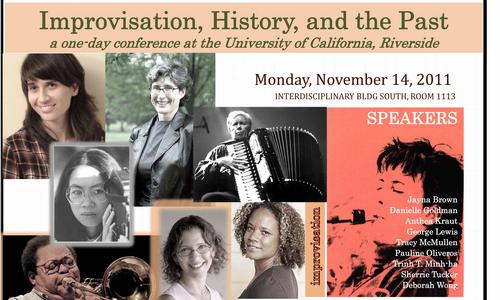Improv Notes: January 2012
|
Email not displaying correctly? View it in your browser |
|
 IMprov Notes: News of the Moment January 2012
Oral Histories Project
Oral Histories is a showcase of interviews, performances, and articles by and about improvising musicians, artists, writers and scholars. This new monthly feature will offer an intimate look inside the minds and practices of some of the many dynamic, innovative people whose energy and ideas make improvisation studies such a vibrant field of inquiry. The Oral Histories project provides a space for improvising artists to be heard in their own words, often in dialogue with other improvisers, scholars and practitioners. Over the coming year, witness conversations with musicians including Dave Clark, Tanya Tagaq, William Parker and Amiri Baraka, writer Cecil Foster, and scholars from fields as diverse as legal studies and musicology. The conversations and performances of this diverse group, drawn from ICASP’s online Research Collection in Improvisation Studies, are sure to inspire and to enlighten. Read ICASP student Paul Watkins' reflective piece on the relationship between orality and improvised musical practices in our Research Collection, here. Inaugural Improviser-in-Residence program with Jane Bunnett was a great success!  In January 2011, ICASP entered a new era of community interaction, research communication and musical dialogue with a yearlong collaboration, including a series of dynamic workshops, with its first Improviser-in-Residence, Jane Bunnett. Jane Bunnett, a Toronto-based soprano saxophonist, flutist, and bandleader, is a multiple Juno Award winner, most recently honoured with an appointment to the Order of Canada. Bunnett is known for her creative veracity and her improvisational and courageous artistry. Performances as ICASP’s Improviser-in-Residence included music interventions held on February 11, 2011 at the University of Guelph Library, Red Brick Café, Bookshelf and the Downtown Guelph Public Library. These were unannounced and spontaneous jam sessions. Throughout the year Bunnett was involved in ICASP and the larger Guelph community through a series of public talks and performances, office hours, and innovative workshops for a variety of organizations: Guelph Youth Jazz Ensemble, Contemporary Music Ensemble, Homewood Health Centre, KidsAbility Centre for Child Development, Guelph-area high schools, Give Yourself Credit, and St. Joseph's Health Centre. Other performances with partner organizations were at the Boathouse and the Guelph Jazz Festival. A final year end celebration of Bunnett's residency took place on December 8th, 2011 at Van Gogh’s Ear. Her endeavors in community outreach and musical partnership were showcased in a performance with KidsAbility at the Guelph Jazz Festival on September 10th, 2011. All of Bunnett’s outreach activities during the year were video documented by Video Producer Dawn Matheson and soon you will be able to view these spectacular videos on the ICASP website. The videos not only show the importance of the program but also demonstrate the wonderful work that can be accomplished through collaborative partnerships between community organizations. We thank Jane Bunnett for her wonderful passion and service to ICASP and the larger Guelph community. Next month ICASP will introduce its next Improviser-in-Residence for the 2012 year! The Improviser-in-Residence program is a collaborative partnership with Musagetes.
The Art and Politics of Irony An interdisciplinary conference hosted by the Institute for the Public Life of Arts and Ideas, in collaboration with Improvisation, Community and Social Practice (SSHRC-MCRI), the Centre de recherche en éthique de l’Université de Montreal and the Département d’études anglaises, Université de Montréal.
A preliminary conference program is now available.
Critical Studies in Improvisation / Études critiques en improvisation invites submissions for a special issue with the theme “Ethics and the Improvising Business,” guest-edited by ICASP Project Director Ajay Heble, Co-Investigator Tina Piper, and Postdoctoral Fellow Mark Laver. We seek contributions from artist/practitioners and from scholars working across the disciplines (music, literature, performance studies, anthropology, organization studies, economics, sociology, gender studies, philosophy, psychology, education, management studies, among others). Potential topics include:
· What does musical improvisation have to offer as a management model for corporations and not-for-profit organizations? In light of the collaborative essence of musical creativity, a growing number of management theorists are looking to group musical improvisation as a model for corporate design. In the post-fordist, global marketplace, sudden change has become a quotidian part of the business experience. Just as a group of improvisers must negotiate sudden musical changes, unanticipated changes in the marketplace demand a similar kind of collaborative response. Faced with the unexpected, many businesses respond with collective flexibility. They establish a profoundly dialogical management structure, encouraging employees of all levels to engage in problem-solving. Akin to the musical knowledge-innovation dialectic, businesses walk the line between what Roger Martin calls reliability and validity, trusting in the knowledge and study that underlies their extant systems and models, while at the same time embracing the promise held by innovation, creativity, and surprise. Above all, they work to engage every individual in the group, giving every employee a sense of collective ownership over the challenges and the solutions. Critical academic essays are encouraged but the editors also welcome for consideration artist statements, commentaries, reviews, interviews and experimental textual forms. CSI/ÉCI encourages the submission of audio and visual content to accompany texts. It is the responsibility of the author to ascertain copyright and gain permissions.
Please visit the criticalimprov website for more detials. Critical Studies in Improvisation/Études critiques en improvisation is an open-access, peer-reviewed, electronic, academic journal on improvisation, community, and social practice housed at the University of Guelph. The editorial and advisory boards are made up of leading international scholars spanning diverse disciplines. CSI/ÉCI publishes twice a year, in May and December. The journal publishes scholarly essays by artists, activists, and intellectuals, as well as reviews of books, performances, and films. Quote of the Month:
Bebop was about change, about evolution. It wasn't about standing still and becoming safe. If anybody wants to keep creating they have to be about change.
-Miles Davis, Miles: The Autobiography
About ICASP
|
|

 Miles Davis
Miles Davis 

